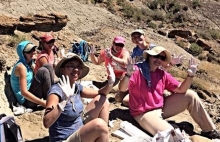“What did you do over your summer vacation?”
Every September, grade school students answer that question with a litany of activities, from sports camps to Disneyland to visiting grandparents. But this year, fifth grade teacher Pam Muncey has them all beat. In late July, at a remote site in Montana, she helped excavate a Tyrannosaurus rex fossil.
“I touched dinosaur bones that were 66 million years old!” exclaims Muncey (BA, English, 1981; TEPFO,1985), a teacher at South Whidbey Elementary in Langley, Washington. “How do you even imagine something that magical and mind-blowing? It still makes me shiver.”
Muncey was among the 35 K-12 teachers from across the country enrolled in the Burke Museum’s DIG (Discoveries in Geosciences) Field School, a professional development program that introduces teachers to the basics of paleontology and immerses them in scientific methods. The year-round program includes a four-day field experience in northeastern Montana, where the teachers get their hands dirty — literally — working alongside researchers at an excavation site in Hell Creek State Park. The site is famous for its wealth of fossils from the Cretaceous period, when triceratops and T. rex roamed.

DIG participants Katrina King (left) and Amanda Fitchett pose next to the partially buried T.rex skull.MEDIA CREDIT: LARRY MOSE
UW professor Greg Wilson began working at the site years ago as a graduate student, and it remains his favorite research setting. He founded the DIG Field School there in 2009 with then graduate student Lauren Berg DeBey (PhD, Biology, 2015). “The idea from the beginning was to give teachers an authentic experience by involving them in whatever we were working on,” says Wilson, associate professor of biology and adjunct curator of vertebrate paleontology at the Burke Museum. “One of the most important things we can give them is a perspective on the process of science and what we actually do, rather than some manufactured experiences that we’d never actually have as scientists.”
Read the full article in Perspectives.

